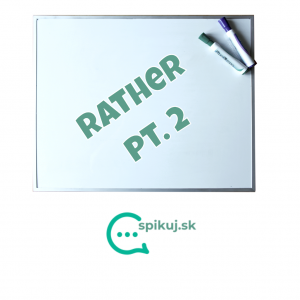
Rather (part 2)
would rather
Výraz woud rather používame na vyjadrenie preferencií – “radšej by som…”. Nasleduje po ňom neurčitok bez to. Veľmi často používame skratku ‘d rather.
- Would you rather stay here or go home?
- How about a drink? – I’d rather have something to eat.
Zápor = would rather not
- I’d rather not go out tonight. (NIE I wouldn’t rather…)
Dôležité:
Would rather like nevyjadruje preferencie v porovnaní s inými predmetmi. V tomto výraze, slovo rather znamená “celkom”.
- I’d rather like a cup of coffee. — I’d quite like a cup of coffe. (Dal by som si kávu… mám na ňu celkom chuť.)
- How about a cup of tea? – Thanks, but I’d rather have a cup of coffee. — Vyjadrujem preferencie. Radšej by som si dal kávu ako čaj. Pužívam iné sloveso ako
would rather + podmet + minulý čas
Výraz would rather využívame aj v prípadoch, ak niečo od niekoho chceme. V slovenčine používame vetu “Bol by som radšej keby si….”. Na vyjadrenie takejto situácie, používame štruktúru would rather + podmet + minulý čas. Napriek tomu, že používame minulý čas, vyjadrujeme prítomnosť alebo budúcnosť.
- I’d rather you went home now.
- Tomorrow’s difficult. I’d rather you came next week.
- My wife would rather we didn’t see each other any more.
- Shall I open a window? – I’d rather you didn’t.
Ak chceme rozprávať o minulosti, môžeme použiť past perfect (predminulý čas).
- I’d rather you hadn’t done that.
Avšak takáto situáciu je skôr vyjadrovaná slovesom wish ako would rather.
- I wish you hadn’t done that.
or rather
Or rather často používame v situáciách keď sa chceme opraviť.
- He’s a psychologist – or rather, a psychoanalyst.
would rather and had better
Veľa študentov si zamieňa použitie would rather a had better, alebo si myslia, že majú rovnaký význam. Would rather = would prefer, had better = should.
- I suppose I’d better clean the windows, but I’d rather watch TV.

